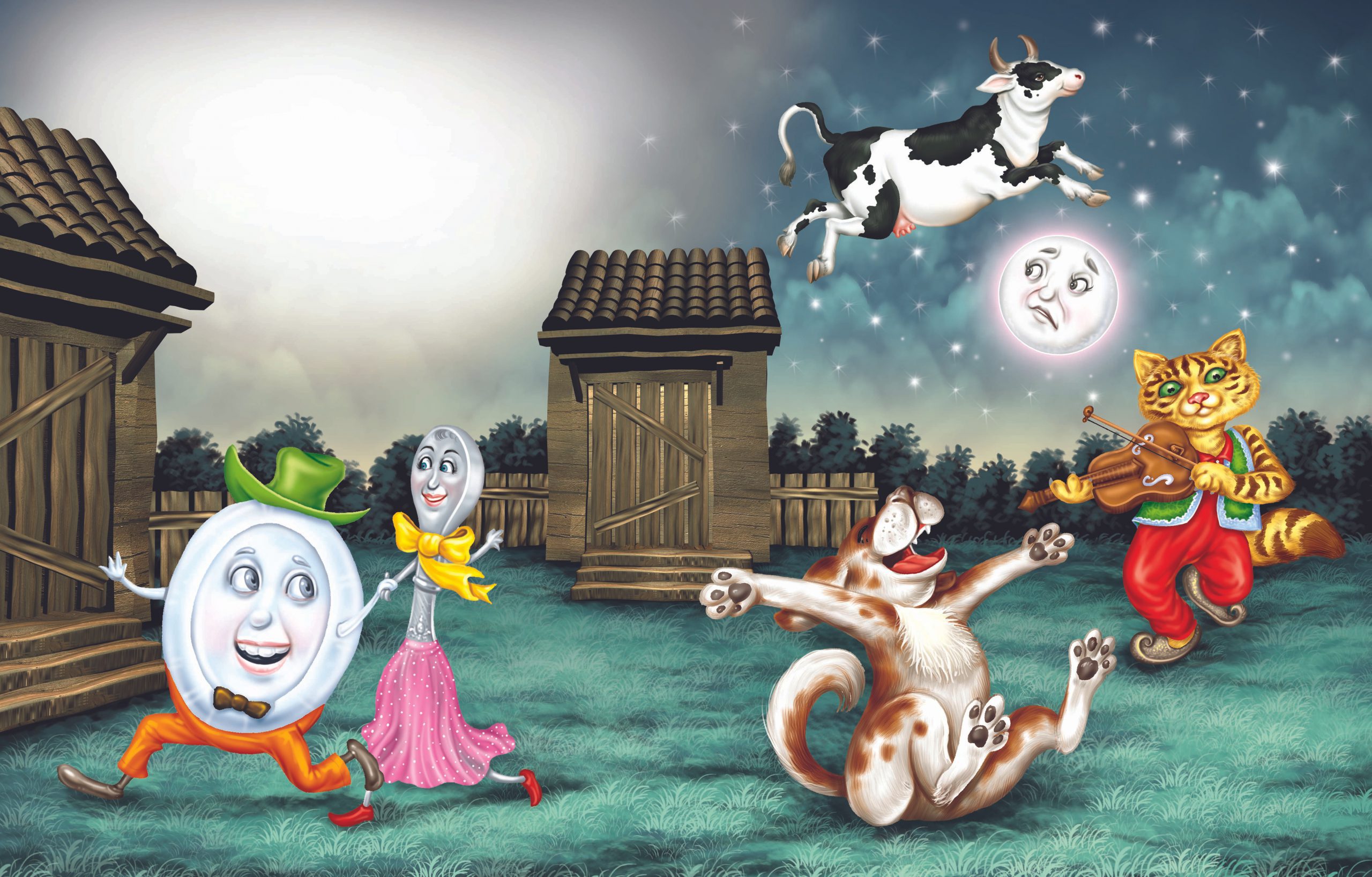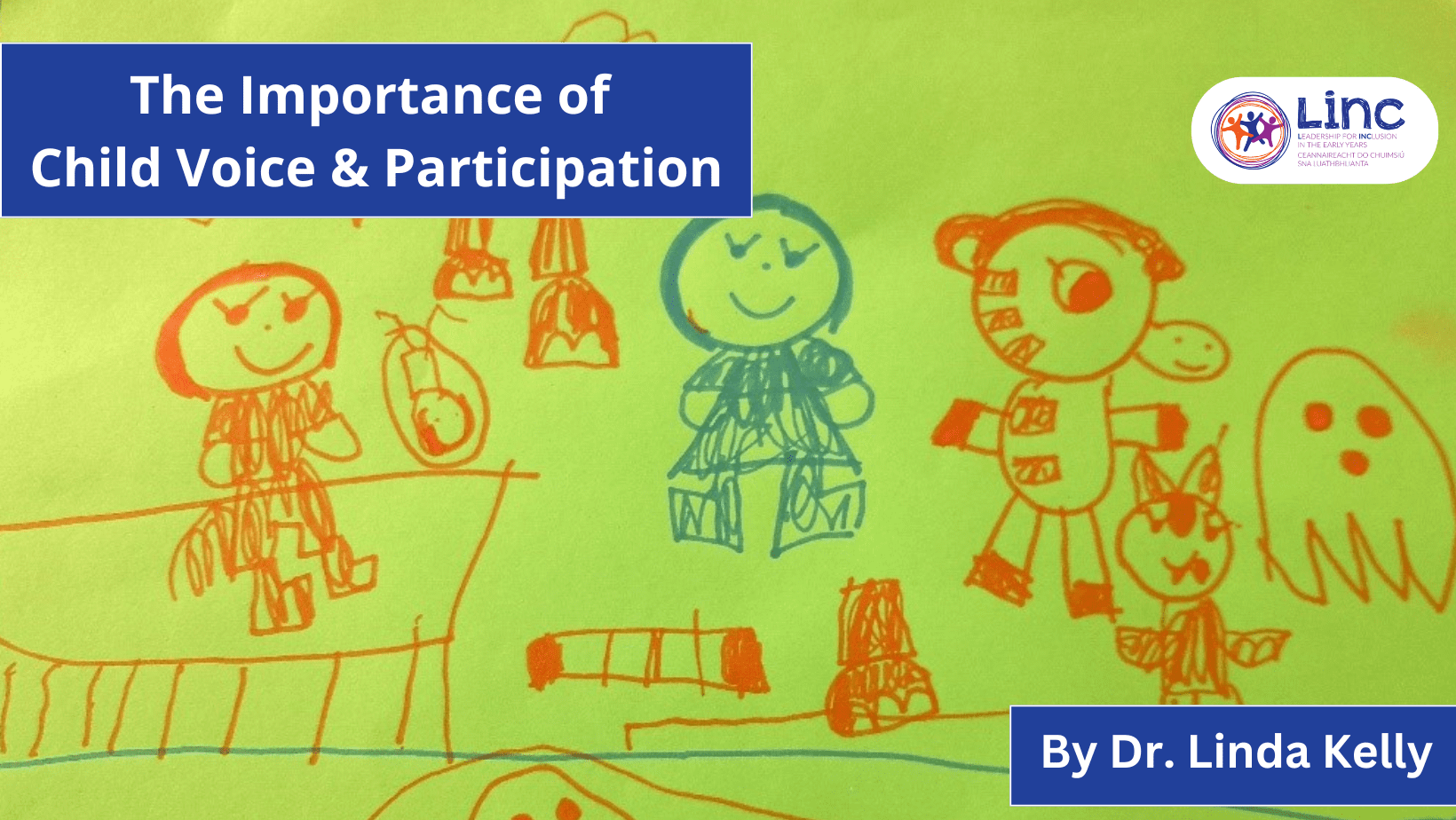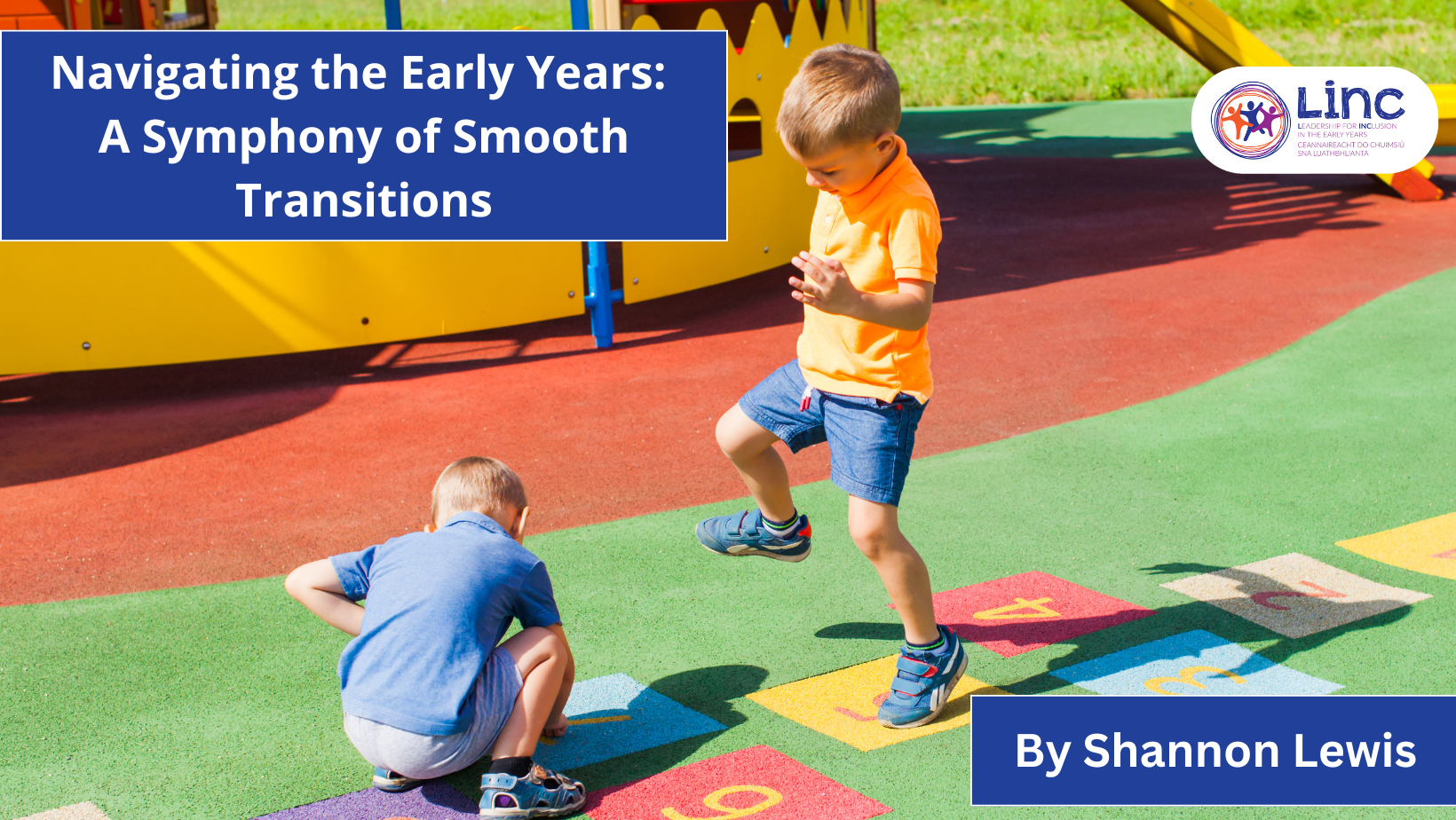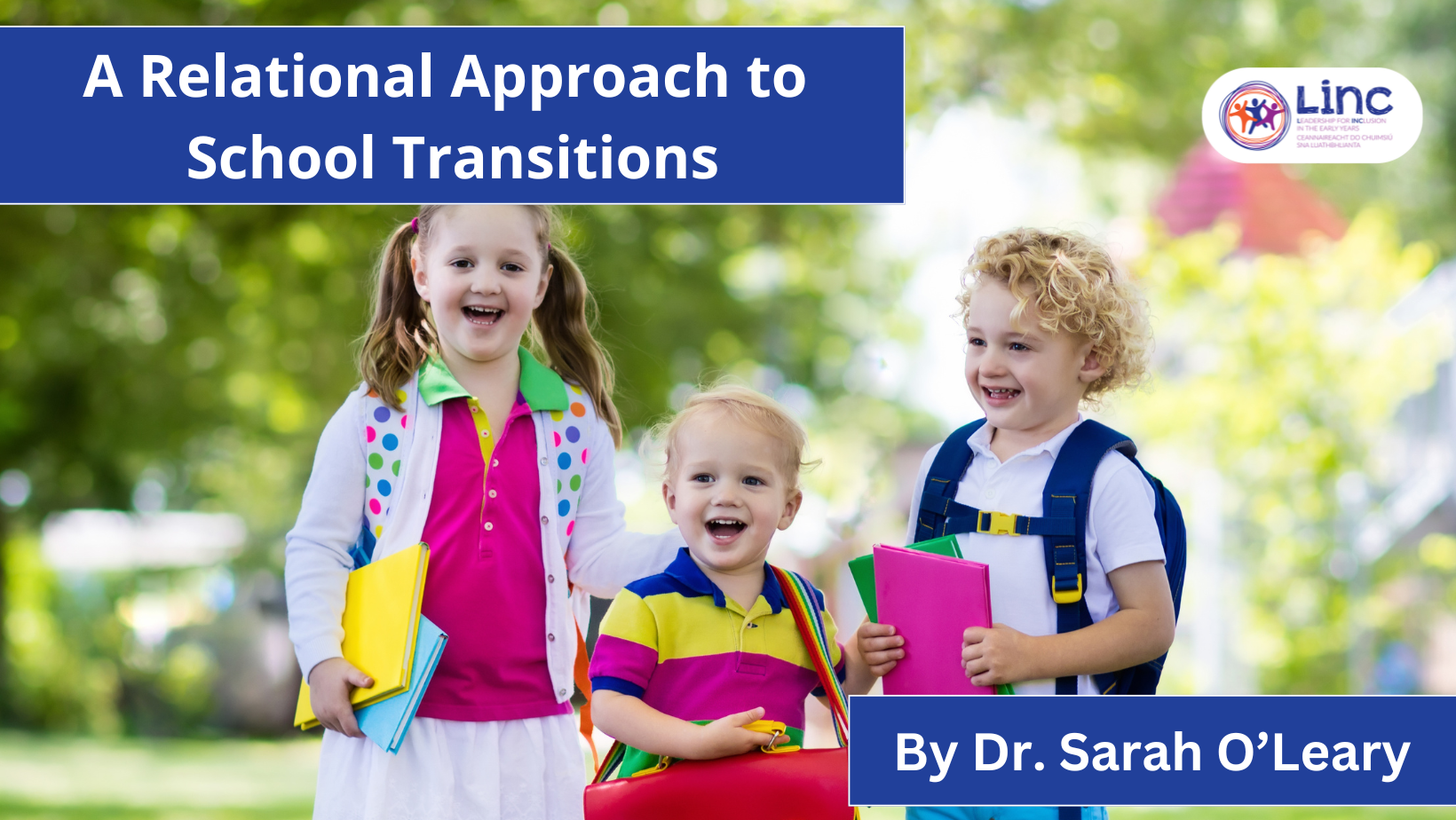The Power of Music & Nursery Rhymes
In this issue of the LINC Blog, LINC Tutor Kathleen Dalton emphasises the significance of music and rhymes in children’s development. While reflecting on her role as Inclusion Coordinator (INCO) Kathleen highlights the enjoyment that music and rhymes brought to the children in her setting.
“Song is tightly intertwined with language development and, like books no child should be without song in their lives” (Daley 2019)
When we think of nursery rhymes we think of Humpy Dumpty or Hey Diddle Diddle, and for some, these rhymes may seem old or out-of-date, however, sharing such nursery rhymes with children will support them to learn through repetition while engaging in an enjoyable experience. Nursery Rhymes also expose children to language they might not hear on a day to day basis, unless of course, you still go up the hill to fetch a pail of water!
As mentioned by Bennett (2010),
“Nursery rhymes are not simplified speech, in fact, the
richness of these poems often lies in their fluid use of
unfamiliar words and the delightful lilt of phrases.”
As an Inclusion Coordinator, it is important to understand the relevance and importance of music, songs and rhymes for all children in their early years. How we incorporate rhyme and music into our interactions with children signifies their effect for the child. Usually at the beginning of a new preschool year, we would introduce the children to each other through a rhyme. We would sing the Clock says Tick Tock. For example, I would sit with the children and sing:
“the clock says tick tock (repeat x3)
it’s time to say hello.
Hello Emma, Hello Aoife, Hello James, it’s time to say hello”
I would repeat this until I said hello to each child. The rhyme provides a fun opportunity to explore sound, rhythm and repetition. While engaging in the rhyme children enjoy adding in some actions such as tapping their knees to the beat or clapping their hands to add rhythm and motion, while getting to know the names of their new friends. This simple but effective rhyme supports not only language development but also social interactions with both peers and with adults in an enjoyable and positive way.
We have some fabulous children who over time enjoy steeping up and coordinating this rhyme as they felt confident in their ability, to not only be a leader in the group but also engage in the role of conductor.
In my setting, I noticed that in our story books there were lots of pictures that encouraged children to sing rhymes and songs, for example, when they spotted a cow, sheep etc., in a book they would burst into “Old McDonald had a Farm”. So why couldn’t we use the stories to support our songs and rhymes? Sometimes while reading books with the children, and as the pages turned we would decide what nursery rhyme the animals on the pages reminded us of. Sometimes the books would link with our emergent theme, for example, when we were looking at the life cycle of the frog and in a story book, we spotted frogs this led us to the rhyme of 5 Little Speckled Frogs. The excitement on the children’s faces when they could link a rhyme to what they could see on the pages of a story was always a fantastic experience, for the children and for myself.
I asked the children in my setting “what is your favorite Rhyme” and they had a lot to say! Some children mentioned “Humpty Dumpty”, “Twinkle Twinkle”, “Mary had a little lamb”, “Five Little Speckled Frogs”, “Happy Birthday” and so on! The children kindly entertained me by performing their rendition of a lengthy collection of songs. I was delighted when on one occasion a child sang her Mothers’ favorite song “Frozen”. This then led to a conversation about our family members and their favorite songs, which took us to our family wall, so we could point out who is who. This example highlights the importance of when providing learning experiences for children, it is essential to follow their lead, which in my experience is always an interesting road to travel as the child’s perspective is so interesting.
When discussing this blog with my colleagues on the LINC Team, we decided to ask many children of various ages what their favorite Nursey Rhyme might be, and the responses are included in the word cloud below, along with, of course the favorite rhymes of the children in my setting. The Nursery Rhymes that appear is the larger text were mentioned the most by the children!
As a child I remember helping out in my cousin’s house and listening to the song “time to say goodbye” by Andrea Bocelli which has instilled a love of classical music in me to this day. This song represents sadness and grief, which is sang in two languages. However, for me it reminds me of fond playful memories of a great summer! So, my advice to those working in the Early Years Sector or at home with children around them, share music, songs and rhymes with children! A good point to remember is that when children hear sound and rhythm in a song, they do not hear if you can or cannot sing well (thank goodness for me!), so do not be afraid to sing each day in whatever capacity it comes to you in. Music has the power to take the mind on a wonderful journey that you and those around will enjoy. So, sing and have fun.


References
Daly, M., (2019) Raising Readers: How to nurture a child’s love of books. Australia, University of Queensland Press
Bennett, P. D. (2010). Rhymeplay: Playing with children and Mother Goose. Van Nuys, CA: Alfred

Kathleen Dalton
LINC Tutor
My name is Kathleen Dalton, and I have worked in the Early Years sector for over 20 years, alongside some wonderful early years educators that supported me through each aspect of my journey to date. I am currently working as a Tutor on the LINC Programme. I have been a part of the LINC Team since 2016 where I began as an assistant tutor to my wonderful colleague Margaret Joyce who still inspires me every single day.
My journey through education has been influenced by my family, colleagues and friends who offered me the support to graduate from level 5 all the way through to recently where I completed an MA in Leadership in the Early Years in SETU Carlow Campus in 2020. While working in the Early Years sector, I delivered the Special Needs Assisting Module at 5 and 6 which led me to where I am today. I enjoy engaging in CPD and I find that working with the LINC Programme, I am still learning so much from my engagement with others.
You may also like:

Children Should be Seen and Heard: The Importance of Child Voice and Participation
Children Should be Seen and Heard : The Importance of Child Voice and Participation In this edition of the LINC Blog, Dr. Linda Kelly explores the critical importance of child voice and participation in early childhood settings. Highlighting key insights from...

Navigating the Early Years: A Symphony of Smooth Transitions
Navigating the Early Years: A Symphony of Smooth Transitions In this edition of the LINC Blog, LINC Graduate Shannon Lewis discusses the the many transitions that children encounter in the early years setting, and how we should "Envision this adventure as a...

A Relational Approach to School Transitions
A Relational Approach to School Transitions In this edition of the LINC Blog, Assistant LINC Tutor & Researcher/Lecturer in Inclusion Education, Dr. Sarah O'Leary explores the critical role of relational pedagogy in easing children's transition to primary...
